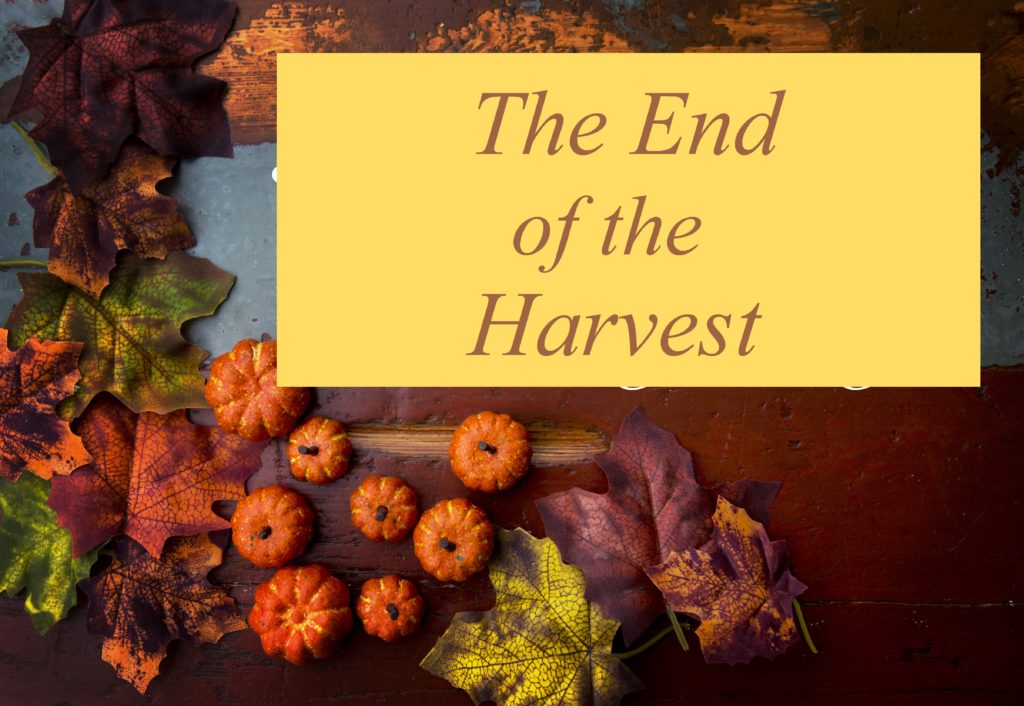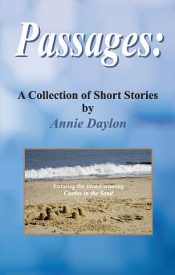by @AnnieDaylon
What follows is a seasonal story, flash fiction, originally written for a 24-hour writing contest for Writers Weekly and currently published in Passages A Collection of Short Stories. It is definitely one of my favorites…

The End of the Harvest
© Annie Daylon
The little boy stands at the log cabin’s rear window, peering out at us. The corn stalks rustle in the brisk breeze, waving at him. Laughing, he returns their greeting. I want to wave at him too, but my limbs are shrivelled now, useless appendages. I sigh. I observe the boy.
He seems happy. Does he know? Has he heard the news about the baby brother that his mom promised him? Maybe. Maybe not. Maybe he is too young to be told.
But I know.
His mom, my caregiver, whispered many secrets as she planted the fields. When my seed sprouted and breached the surface of the rich soil, she stooped and told me about the life that was developing inside her own body. She promised that she would create siblings for me just as she was doing for her little boy. I beamed with pleasure for I did not want to live a solitary life.
In a short time, her truth became evident: I was surrounded by an abundance of relatives—long and green, round and yellow, plump and orange. So strong was my appreciation of my caregiver, so great was my loyalty to her that I tolerated without question the summer heat and the frequent watering and the incessant buzzing of the hordes that swarmed around, flitting from flower to flower. Without complaint, I obliged when she redirected the growth of my rapidly spreading arms. ‘Not here, but there’, was her mantra, as she donned kid gloves and shifted my limbs around. So much attention. So much care. I noticed that the bodies of both my caregiver and me were becoming spherical, and that hers seemed to achieve the desired shape more easily than mine. Obviously aware of that, she added regular rotation to my fitness regime. I responded by becoming corpulent and carroty.
The summer lazed away and autumn slid in to replace it. The rains came. And the mud. And the children, bus loads of children, laughing and trampling and squelching through the muck. Choosing and plucking and stumbling away with their heavy bundles. One by one, my brothers and sisters and cousins disappeared. I wondered how it was that so many school children whirled around me, brushed against me, slid past me, and yet, none chose me. My caregiver explained that she had great plans for me, that I was the chosen one, the one who would light her doorway on that important night—All Hallows’ Eve. I would be the first to welcome the newborn child she would carry to the door that very day. I would witness the smile on her little boy’s face when he first saw his new brother. All this she promised me.
But sometimes promises are broken.
When I had grown to the size of a soccer ball, I looked to compare my shape with hers and realized that her spherical form had vanished. Her body had flattened, returned to its former size. Her spirit, too, had vacated, leaving only sadness, which bled through her pores. Empty in both body and spirit, she had no words, no whisperings. On most days, she just stayed away.
So now I lie here—alone. Leading a solitary life after all, the very life I did not want. But what of the boy? Is he still waiting for his new brother?
The dusk deepens on this, All Hallows’ Eve. The wind picks up and the front gate swings and creaks. Puffs of blue smoke rise from the kitchen chimney. The house is well-lit now, but here, in my resting place, it is dark and lonely. As night falls, my body sinks and just sits, marinating in mud.
Suddenly, the cabin door opens and she emerges. She dons her heavy boots and, with her head low, trudges through the mud toward me. Nearer and nearer. As she stoops, I long to console her, to slide my arms up her back and embrace her. But my arms are just flaccid vines and it is she who comforts me, talks to me, apologizes for leaving me alone for so long. I want to tell her that I understand. She reaches into her pocket, retrieves a knife and frees me from my vines. Then, she hefts me into her arms and straightens her back.
On the way to the cabin, my caregiver explains that there is a new plan—that she wants me to smile for her young son. This evening, she will carve a grin on my face and, while she is doing that, she will tell her son that he will always be a solitary child. We reach the porch and hover there, waiting for her body to stop trembling and her tears to abate.
Despite her distress, I am pleased with this new plan. I want her to carve me a ridiculous grin, tooth-filled or toothless, whatever it takes to ease a lonely boy’s acceptance of unwelcome news. I know of the difficulty of the solitary life. Unlike the boy, I have experienced the joy of siblings; however, many died before maturity and all the others were taken away. Like the boy, I represent the end of the harvest. I am the very last pumpkin from the pumpkin patch. Together, the boy and I—and our mutual caregiver—will face the night.
*****

My best to you,




 Airborne at last, after a lifetime of longing.
Airborne at last, after a lifetime of longing.